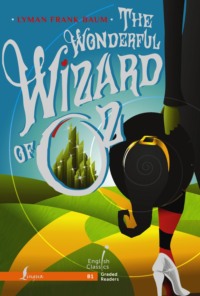
The Wonderful Wizard of Oz. B1 / Удивительный волшебник из Страны Оз

Лаймен Фрэнк Баум
The Wonderful Wizard of Oz. B1 / Удивительный волшебник из Страны Оз
© А. А. Грек, адаптация, словарь, упражнения, 2024
© ООО «Издательство АСТ», 2024
Chapter 1
The Cyclone
Dorothy lived in a little house in Kansas, with Uncle Henry, Aunt Em, and a small black dog whose name was Toto. They had a little house. Uncle Henry and Aunt Em had a large bed in one corner, and Dorothy a little bed in another corner.
When Aunt Em came there to live, she was a young, pretty wife. Now, she was thin, gray and gaunt, and never smiled. When Dorothy, who was an orphan, first came to her, Aunt Em had been so startled by the child's laughter that she would scream and press her hand upon her heart whenever Dorothy's merry voice reached her ears; and she still looked at the little girl with wonder that she could find anything to laugh at.
Uncle Henry worked hard from morning till night and did not know what joy was. Uncle Henry never laughed. He was gray also, from his long beard to his rough boots, and he looked stern and solemn, and rarely spoke. It was Toto that made Dorothy laugh. Toto played all day long, and Dorothy played with him, and loved him dearly. Toto was not gray; he was a little black dog, with long silky hair and small black eyes that twinkled merrily on either side of his funny, wee nose.
When Dorothy stood in the doorway and looked around, she could see nothing but the great gray prairie on every side. Not a tree nor a house broke the broad sweep of flat country that reached to the edge of the sky in all directions. There were no trees and no hills in Kansas, and it was often very windy. Even the grass was not green. Sometimes the wind came very fast and very suddenly. It was a cyclone, and it blew trees and people and houses away. Everyone had cellars below the houses. And when there was a cyclone, people came into their cellars and stayed there. One day Uncle Henry went out and looked up at the sky. Aunt Em was washing the dishes. Dorothy stood in the door with Toto in her arms, and looked at the sky too. Suddenly Uncle Henry ran quickly back into the house. 'There will be a cyclone,' he called to Aunt Em and Dorothy, 'We must go into the cellar!'
Конец ознакомительного фрагмента.
Текст предоставлен ООО «Литрес».
Прочитайте эту книгу целиком, купив полную легальную версию на Литрес.
Безопасно оплатить книгу можно банковской картой Visa, MasterCard, Maestro, со счета мобильного телефона, с платежного терминала, в салоне МТС или Связной, через PayPal, WebMoney, Яндекс.Деньги, QIWI Кошелек, бонусными картами или другим удобным Вам способом.
Вы ознакомились с фрагментом книги.
Для бесплатного чтения открыта только часть текста.
Приобретайте полный текст книги у нашего партнера:
Всего 10 форматов